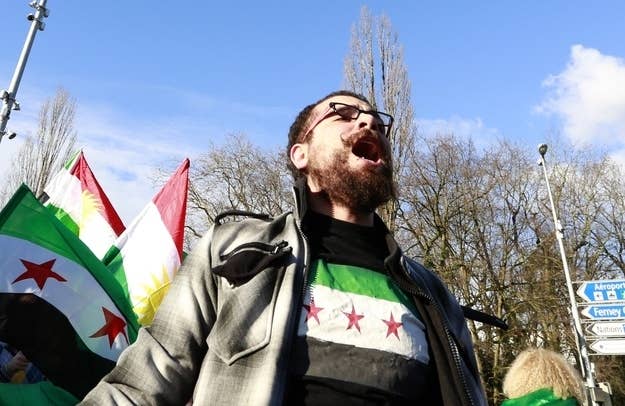
GENEVA — The first day of face-to-face meetings for Syria's peace talks started with a snub, as far as some in the opposition were concerned. When their delegation entered the room on Saturday — in the United Nations compound in Geneva — they expected to find the regime's top players on the other side.
Instead it was led by Bashar al-Jafaari, the Syrian ambassador to the U.N., whom they pegged as a few spots down the list. "It's because the regime is not all that serious," said Munzer Aqbiq, the spokesman for the opposition's president.
Aqbiq guessed at some motives for the move — riling the opposition, making them lose their cool. Maybe the regime was trying to undercut the talks, or find a way to stall them. "They don't want to get the ball rolling," he said.
There were more inauspicious beginnings to the talks, which had kicked off after a day-long delay so fraught with rumors that a U.S. official felt the need to assure reporters they hadn't been canceled entirely. The Saturday morning meeting was face-to-face, but the two sides didn't talk, sitting in silence as the U.N. mediator laid out the agenda. The two delegations came and went through separate doors.
A second session later in the day was more productive, lasting two hours. Afterward, the U.N. mediator, Lakhdar Brahimi, started a press conference with the caveat that the talks "haven't achieved much." But he said they'd focused on a point he hoped could lead to progress: getting humanitarian aid to the besieged city of Homs.
The opposition, meanwhile, said they felt good about their first encounter with the other side. "They were quite astonished by our performance," said one member of the opposition delegation who declined to be named. "Then they started to maneuver."
He added that the opposition's proposal for getting aid to Homs — which would involve a local ceasefire — had caught the regime delegation off-guard. Their response, he added, was to try and buy time. "For them it's hard to make decisions on the spot. It's always about getting back to their boss," he said.
He also mentioned that it was strange facing down his countrymen at the negotiating table and guessed that the regime side felt the same. "Syrians are very proud of their negotiating skills. But now they are faced with the same people — we are made of the same metal," he said. "So let's see how they perform."
Measures such as local ceasefires and prisoner exchanges have been pushed aggressively by the conference's international backers as small but necessary preliminary steps, a way to build confidence before the negotiations enter their most important and difficult phase: trying to get the two sides to agree to a transitional governing body that might guide the country out of its devastating war.
In his remarks, Brahimi said he was optimistic the aid could arrive in Homs on Monday, and said it was now up to local authorities. But even if the ceasefire is agreed, it could be difficult to maintain. And a broken ceasefire could be especially damaging for the opposition, analysts said.
Andrew Tabler, a Syria specialist at the Washington Institute for Near East Policy, warned that a broken ceasefire would play into the regime's hands. It aims to show the opposition as divided and unable to influence the situation on the ground — and to make the case that it has no business sitting down at the negotiating table. "Once the opposition agrees to something, they have to implement it," Tabler said. "If they can't, it makes them look bad, and I think this has been the regime's game from the beginning."
Tabler added that the opposition's ability to enforce a ceasefire depended on the locale. Many of the armed groups inside Syria operate outside the control of the opposition body represented in Geneva; some have painted the talks as treasonous.
Amr al-Azm, a U.S.-based member of the Syrian opposition and professor at Shawnee State University in Ohio, pointed to another potential concern. The talks, he said, could end up getting stuck on humanitarian issues, which he called "the low-hanging fruit" for the opposition and its international backers. "From the opposition's perspective it's the soft underbelly, because essentially it's the opposition's people who are suffering," he said. "It's important for the opposition to take a strategy that on the one hand takes whatever they can get on those things and on the other does not give an inch on discussions in the transitional governing body."
As one diplomat from a country that supports the opposition put it on Saturday, "We should get down to business as soon as possible." The focus of the peace talks should move quickly to political transition, he said.
"If they are not going to discuss a transitional governing body, there is no point to the process anyway," he said. "The purpose of the regime is to look like they are negotiating and not really make progress. And our purpose is to make them make progress."
